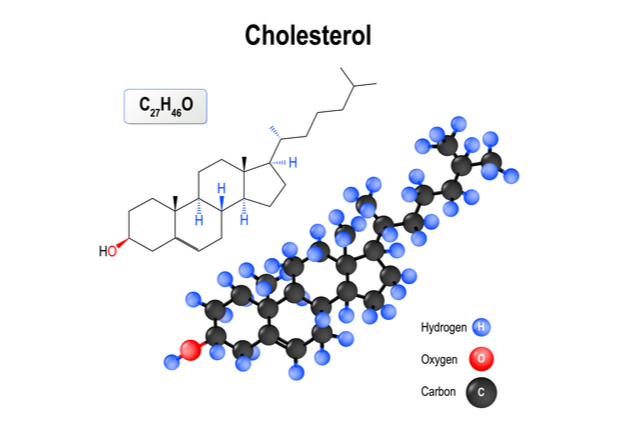The misguided war waged against Cholesterol for the last 40 years has led us to believe that Cholesterol is something harmful. Many people try to reduce it by avoiding food containing cholesterol or by the use of cholesterol-lowering drugs, such as statins. Each week I have to reiterate the importance of cholesterol in the body, especially when it comes to fertility and hormonal, neuronal health.
What do you think Cholesterol is?
Actually Cholesterol is a substance essential for mammalian cell functions and structural integrity. The liver synthesizes it in a total of about 39 steps.
Cholesterol is an extremely important biological molecule that is a structural component maintaining the permeability and fluidity of the cell membrane including the sperm membrane. Also, it is a precursor for the synthesis of the steroid hormones, the bile acids, and vitamin D, all vital elements of fertility.
Every cell of our body is made from it and the cellular supply of cholesterol should be maintained at a steady level. Due to its important role in membrane function, all cells express the enzymes of cholesterol biosynthesis.
Cholesterol fulfils a number of important biological functions as follows and balance between synthesis and catabolism of cholesterol should be regulated to ensure cellular functions, NOT reduced! Cholesterol is very relevant in the maintenance of male and female fertility.
- It is integral in cellular structure and function. It maintains cellular membrane integrity and acts as cell transporters and signalling molecules. Regulation of the fluidity of the plasma membrane is an important function of cholesterol.
- Cholesterol, as the initiator of steroid hormone synthesis, is a long known modulator of both female and male reproductive physiology especially at the level of the gonads. Cholesterol regulation/dysregulation has a huge impact on egg and sperm development and male and female reproduction.
- All classes of steroid hormones, ie the sex steroid hormones and adrenal hormones are derivatives of cholesterol. Cholesterol synthesis occurs in the placenta and ovaries (oestrogens and progesterone), testes (testosterone) and adrenal cortex (cortisol, aldosterone, and androgens).
- The nerve cells are covered with a cholesterol-rich layer of the myelin sheath. It provides protection, insulation and allows more efficient conduction of nerve impulses. In the human body, the most cholesterol-rich area is the brain and that synthesizes its own cholesterol.
- In the liver, cholesterol is converted into bile, which is then stored as bile acids in the gallbladder. Bile helps the absorption of the fatty acids and fat-soluble vitamins A, D, E and K.
Your body makes hormones from cholesterol

“Diagram of the pathways of human steroidogenesis”
Consider the vitally important functions of the 6 steroidal hormones, all of which are derived from cholesterol:
- Androgenic hormones such as DHEA and testosterone are critical for libido, as well as maintaining bone density. Studies have shown that low levels of DHEA correlate with poor bone density and osteoporosis. DHEA is also critical for memory and anti-ageing.
- Progestagens such as progesterone are vitally important for regulating women’s menstrual cycles and are the ‘gestation’ hormones.
- Oestrogens such as oestradiol are critical for sexual development and have various functions for bone and brain health.
- Vitamin D is technically a sterol, but functions as a steroidal hormone. Vitamin D is converted in the liver and has hundreds of vital immune-supporting functions. Vitamin D is also critical for calcium regulation in the blood.
- Glucocorticoids are vitally important for the metabolism of carbohydrates. The most important glucocorticoid is cortisol, a powerful adrenal hormone that has multiple functions in the body. Cortisol is also a powerful anti-inflammatory hormone that opposes immune hyperfunction.
- Mineralocorticoids hormones such as aldosterone are hugely responsible for water/electrolyte dynamics through the control of sodium and potassium.
Bottom line:
Cholesterol is the precursor to all steroid hormones and is a very significant marker to what is going on in the body. The majority of high cholesterol in the blood occurs due to an age-related decline in steroid-hormone production or the deficiency of steroid hormones.
Lowering of cholesterol levels is not something we want to achieve.
For correct info on Cholesterol and LDL, I recommend Dr Nadir Ali’s excellent presentation: The Paradox of Insulin Resistance versus LDL Cholesterol
Cholesterol: A Gatekeeper of Male Fertility?
Male reproductive function is dependent on cholesterol regulation (homeostasis)
-Testosterone formation
-Sperm formation
-Sperm membrane





